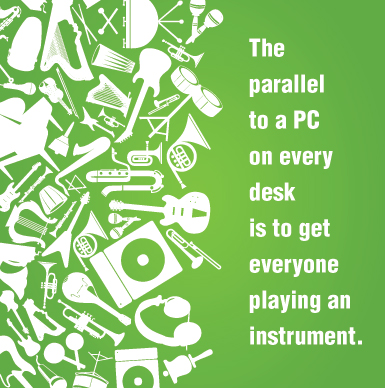 By Dan Vedda
By Dan Vedda
We’ve often talked about the “unique” aspects of our industry: the passionate, hands-on, geek-lust involvement of both consumers and purveyors of music products. “Outsiders don’t get MI” is the common refrain, usually referring to both the models and mechanisms of our business and the outsized passions and peccadilloes of the personalities involved. Legendary stories of CBS suits running Fender and other companies into the ground in the ’70s still resonate in the industry as examples. But, over the last few years, the industry has changed (in good and bad ways), the consumer has changed (ditto) and the very way commerce exists has changed. Although I still believe our industry has some aspects that only a “lifer” can fully understand, I think there’s more to be learned from the rest of the economy than we’re often willing to admit. And, furthermore, I think it’s past time that we change that attitude and learn everything we can.
Gone are the freewheeling days of generous, minimal-diligence, buy-now-pay-later stocking deals, markets with few competitors, “legacy” relationships with schools and a never-ending supply of guitar-obsessed teens ready to buy anything with a full set of strings. We’ve had to figure out new models, new products and new consumers, all while watching our old ways recede faster than our collective hairline. It takes fortitude, to be sure, but, more than that, it takes vision to see ahead on a road we’ve never traveled. It ain’t easy, folks.
Only the most visionary person would have walked around in the early 1990s anticipating that, within 20 years, we’d all carry around powerful computers that fit in one hand, communicating, watching movies, photographing, newsgathering and even shopping—anyplace, any time. Accessing the total of our collected knowledge and history in an instant wasn’t even a practical consideration. (Unless, of course, you were a “Star Trek” fan….) Only a near-prescient seer could look at the ungainly chunks of technology we were playing with then and believe that they represented the building blocks of a paradigm shift and, more importantly, comprehend what the new paradigm might be.


